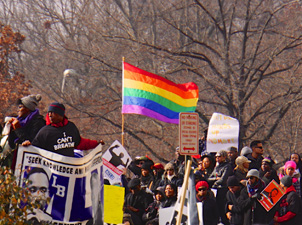
Mending the Gaps Experienced by the LGBTQ+ Community
Siena Ruggeri
June 7, 2019
NETWORK is proud to have supported the recent passage of the Equality Act in the House, and we urge the Senate to also pass this important legislation. While the Equality Act would extend critical anti-discrimination protections to the LGBTQ+ community in both the workplace and housing, many of NETWORK’s Mend the Gaps other issues have a direct impact on the LGBTQ+ community. As we work to mend the gaps in our nation, it is important to consider the challenges facing the LGBTQ+ community and ways federal policies can reduce those challenges.
Paid family leave, for example, is a significant issue for LGBTQ+ families. Even in areas and workplaces that do offer paid leave, LGBTQ+ families face an extra hurdle to taking the necessary time they need to be with their families. According to a survey by the Human Rights Campaign, 27% of LGBTQ+ people of color and 16% of LGBTQ+ white people say they are afraid to request time off to care for a loved one because it might disclose their LGBTQ identity. 44% of LGBTQ+ people of color are afraid of losing their job if they took paid leave, compared to 37% of their white counterparts.
Paid family leave is already challenging to access for countless families. LGBTQ+ workers have to disclose their gender identity or sexual orientation in order to access paid leave, putting them in a highly vulnerable spot. In our efforts to expand access to paid leave, we must intentionally include all types of families. This is why legislation like the FAMILY Act (H.R.1185) is so important to advance — this policy has a broad definition of family, allowing for all types of families, biological and chosen, to take equal advantage of paid leave.
LGBTQ+ people may also face barriers to healthcare because of discrimination against their gender identity and/or sexual orientation. Just last week, the Trump administration proposed rolling back an Obama-era HHS rule called the Health Care Rights Law, which ensures healthcare providers cannot discriminate on the basis of sex. The rollback of this rule will strip away the protections established by the ACA, which were critical for LGBTQ+ healthcare access.
According to a 2015 report by the Center for American Progress, 23.5% of transgender respondents and 10.3% of LGBT people of color avoided doctors’ offices in the past year due to fear of discrimination. Ensuring affordable, accessible healthcare is an LGBTQ+ issue, and we must consider the unique challenges the community faces as we advocate for greater access to quality, affordable health care.
LGBTQ+ issues also intersect with immigration. Those who identify as lesbian, gay, and bisexual are three times more likely to be incarcerated. As a result, LGBTQ+ migrants are uniquely vulnerable to overpolicing, discrimination, and violence. There has also been an increase in violence towards undocumented LGBTQ+ people. According to the Center for American Progress, 6% of survivors of hate violence were LGBTQ in in 2014, compared to 17% in 2015. While immigrants already face discrimination, those who also identify as LGBTQ+ face even more danger.
The threat of deportation is also a life or death issue for countless LGBTQ+ migrants. 76 countries allow the criminalization of sexual orientation and gender identity. This means many of our nation’s refugees seeking asylum are fleeing their home countries based on the threat of violence due to their LGBTQ+ identities. By denying asylum claims and deporting undocumented LGBTQ+ immigrants, our nation is putting their lives at risk. The Trump administration’s attacks on immigrants puts already vulnerable LGBTQ+ immigrants in dangerous, often life-threatening situations.
The experiences of the LGBTQ+ community intersect with each of NETWORK’s Mend the Gaps issues. This Pride Month, we continue to work toward federal policies that bring justice and equality for the LGBTQ+ community in the United States.







